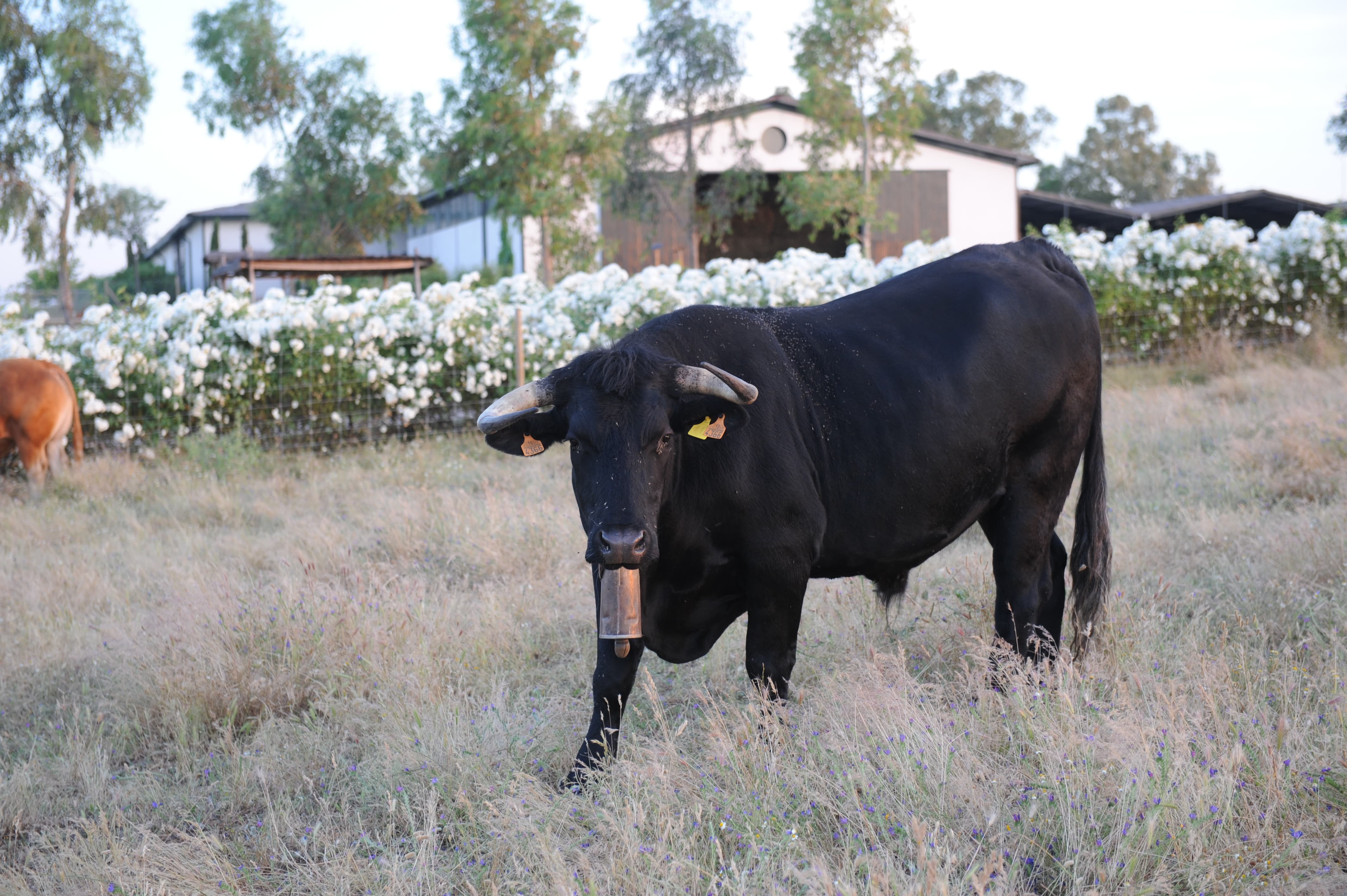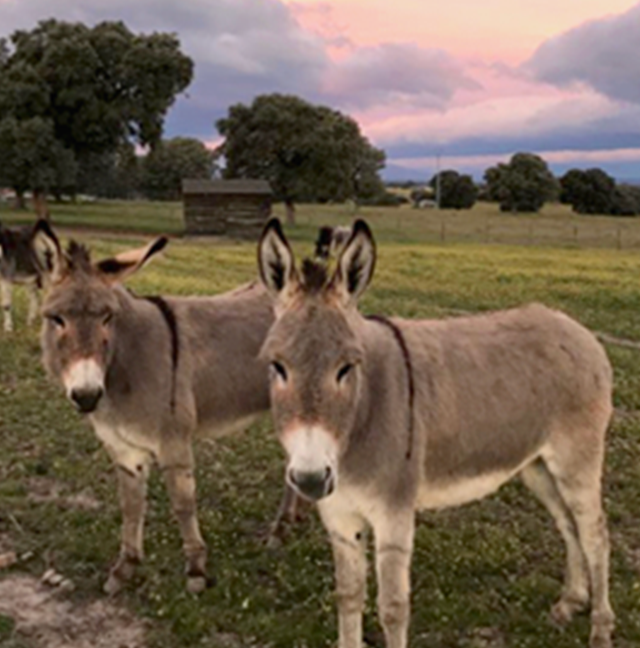Our ecological poultry breeding system is based on providing the most similar conditions to what birds would have living in freedom, enjoying wild pasture and with free access to the hen huts where they can find shelter if weather is unfavourable. They also get organic feed to complement their natural diet of insects, herbs and leftovers taken from the fruit garden.
These are the basic general foundations of our system:
Rotation. We have movable hen huts that allow us to apply a rotational scheme to our poultry activity. Doing it so, we can guarantee the integrity of our organic system as:
- We secure soil and groundwater caring. Dehesa El Milagro differs from other farms in our concern in rotating animals to keep our resources avoiding their overexploitation. Poultry is treated as any other livestock and birds are kept in the rotation cycle as cows or sheep. We are strongly aware of not exceeding the amount of 170 kg of nitrate per hectare and year, a volume that is compulsory for organic farming, as any overload would pollute the soil.
- We are very concerned on avoiding subsoil water and groundwater contamination.
- We also engaged in protecting our birds’ health as a high concentration of manure would imply a source of toxins and pathogenic micro-organisms.
Organic waste management. We use poultry manure in fertilising our crops and our fruit garden. We use chicken and hen droppings in the dung heap as it adds nutrients, high levels of protein and minerals. Compost is also essential to inactivate pathogenic activity, transforming the organic waste in a high quality manure that will enrich our lands.
Animal welfare. We trust in low density rates in breeding and outdoors growth, combined with the possibility of sheltering in hen huts. We avoid overcrowding as a way to prevent infections and the subsequent use of antibiotics that can affect the food chain and harm human beings. Antibiotics are allowed in ecological breeding but always respecting quarantine periods to counteract potential damaging effects.
Biosecurity. We have developed a strict bird management protocol to avert possible health problems. A particularly important point in this strategy is controlling the contact of the domestic poultry with other wild birds and other livestock present in the farm.
Know-how. We work hand in hand with Avialter (Asociación Avícola Alternativa, Alternative Poultry Association) to improve all these principles. Carlos Terraz, as Head of Avialter led us in implementing them almost since the foundation of Dehesa El Milagro.
Our poultry activity is focused in the breeding of three different bird species: laying hens, broiler chicken and organic capons.
Laying hens
Our pilot program was based on a small handmade hen hut with a capacity of 60 hens. Afterwards, we built 60 square meter hen huts made to hold up to 360 hens (respecting the ecological principle of not having more than 6 hens in every square meter; and taking into account that in conventional poultry farms can exceed that limit in up to four times that figure).
Density outdoors is based on the principle of a minimum of 4 square meters per hen, a very low density rate.
We guarantee animal welfare by avoiding some cruel customs in conventional poultry. Practices as debeaking or alterations of light cycles to force egg laying are forbidden in our understanding of poultry. Besides, we allow roosters to be in the hen huts to keep a normal behaviour in the groups.
We work with hybrid races as they secure the absence of salmonella in origin. Indigenous species are bred without any guarantees in biosecurity. Besides this mixed races assure a high lay ratio that ensure a profitable performance. Our laying rate is between a 60% and a 70% on average. Working with indigenous species helps to maintain native races but they are hardly profitable.
The way we feed and treat our hens helps them to produce better eggs, with more presence of beta-carotenes in the yolk, giving a brighter yellow to its colour and a better and more intense taste. We make our feedstock using the best cereals and protein plants using our own formula.
Free-range organic eggs are the result of a way of living and feeding that improves not only their taste but also their quality. They are cholesterol-free, healthy and they contain pro-vitamin A and Omega-3 and Omega-6 fatty acids that help the neurological development of babies in their first years of their life.
Another distinguishing characteristic of Dehesa El Milagro eggs is that they are extra-fresh as they are collected and packed in less than four days, they are served weekly to our customers, cutting to a third the regulatory time limit of 21 days allowed in the EU.
Broiler chicken
Our broiler chickens belong to the naked neck breed, a slow growth stock. They are adapted to higher temperatures as they have less feathers covering the breast and thighs. They need at least 14 weeks (around 90 days) to acquire a level 3 weight (2 Kg carcass), what means doubling the time industrial chickens need to get that mass. They are raised outdoors what helps them to develop their natural defences, growing naturally and developing their organs and bone structure.
They can move freely to our meadows where they spend most of their time (weather permitting) eating grass, insects and worms that complete their feeding based on a ecological cereals and corn diet. These conditions give their meat a firmer and tastier meat, as in comparison with the average industrial broiler chicken. The exercise combined with the exposition to sunlight helps them to synthesise vitamin D and this contributes to a better calcium absorption and setting. Chicken meat is considered as white meat, with low saturated fats, especially if skin is not eaten. But as we are speaking of organic meat, even if you eat the skin, you can benefit from a healthy and nourishing food, much appreciated gastronomically.
Organic capons
All our capons are eco-certified. They are rustic and well adapted to the conditions they grow in. They also belong to the naked neck breed and they also need their time to reach maturity. Their breed is key to their premium quality meat.
They are surgically castrated when they are nine weeks-old and they are set free two weeks later. They grow until they get to their 26th week of life. They are docile and less active birds and that lifestyle allows them to gain fat, increasing meat quality. They live freely although they are offered shelter in case they need protection. They enter and exit as they wish and they usually go outdoors during the day. Their welfare is guaranteed and allots them to have a harmonious growth following natural sunlight cycles.
Capons have a lean meat, softer, juicier and tastier than a regular chicken. Among poultry, capon meat has an intense taste that combines both a mature and tender texture. So, capon can be cooked in longer cycles to extract all their balance and smoothness.
Considered as one of the healthiest meats, the interspersed fat is more present than in the regular chicken meat. These fat is mostly oleic acid (Omega 9) and polyunsaturated fatty acids (mainly linoleic acid, Omega 6). Capon meat has less cholesterol than chicken meat.
It is also a source of calcium and zinc minerals of high availability, as well as of phosphor and potassium. It also contains low quantities of calcium and magnesium. It also has vitamins (especially of the group B type: thiamine, riboflavin, niacin and B6 and B12 vitamins). It also contains small amounts of folic acid.






